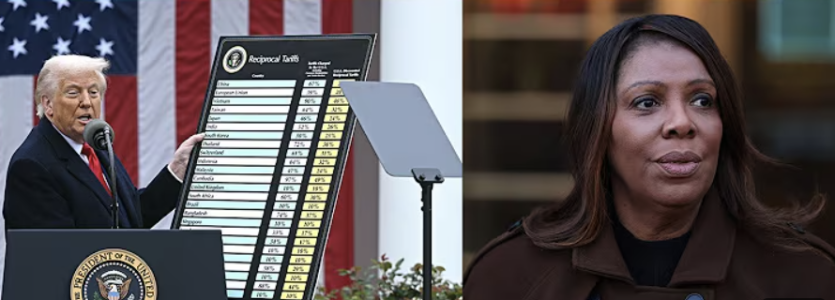From tariffs to the courtroom: 12 states challenge sweeping trade policy under Trump
By
Veronica E.
- Replies 6
In recent years, conversations around trade policy have moved from Capitol Hill to the dinner table—impacting prices, job markets, and long-term financial planning.
For many Americans, especially those living on fixed incomes, decisions about tariffs aren’t just political talking points—they’re personal.
Now, a group of 12 states is taking a major step by filing a lawsuit that challenges how tariffs have been implemented under President Donald Trump.
At the center of the lawsuit is a question of limits—specifically, the limits of presidential power when it comes to imposing tariffs.
The states argue that the Trump administration’s use of the International Emergency Economic Powers Act (IEEPA) to justify certain tariffs may have exceeded the intended scope of that law.

According to the IEEPA, such powers are typically reserved for addressing “unusual and extraordinary threats” from abroad.
Filed in the US Court of International Trade in New York, the lawsuit asks the court to declare the tariffs unlawful and prevent government agencies from enforcing them.
The complaint describes the tariff actions as overreaching and calls for more Congressional oversight in decisions that have nationwide economic impact.
The lawsuit states, "By claiming the authority to impose immense and ever-changing tariffs on whatever goods entering the United States he chooses, for whatever reason he finds convenient to declare an emergency, the President has upended the constitutional order and brought chaos to the American economy."
The lawsuit has been brought by 12 states: Arizona, Colorado, Connecticut, Delaware, Illinois, Maine, Minnesota, Nevada, New Mexico, New York, Oregon, and Vermont.
These states argue that the tariffs have disrupted local economies and created uncertainty for businesses and consumers.
In a public statement, Arizona Attorney General Kris Mayes described the Trump administration’s tariff approach as "insane," adding that it was "not only economically reckless—it is illegal."
Connecticut Attorney General William Tong echoed similar concerns, saying, "Trump's lawless and chaotic tariffs are a massive tax on Connecticut families and a disaster for Connecticut businesses and jobs."
In response, the Trump administration has defended its approach.
In response, White House spokesman Kush Desai criticized the lawsuit, saying Democratic attorneys general were "prioritizing a witch hunt against President Trump."
He added, "The Trump Administration remains committed to using its full legal authority to confront the distinct national emergencies our country is currently facing—both the scourge of illegal migration and fentanyl flows across our border and the exploding annual US goods trade deficit."
Alongside the 12-state effort, California has filed its own legal action in the Northern District of California.
California Governor Gavin Newsom filed a lawsuit last week in the US District Court for the Northern District of California, challenging the Trump administration’s tariff policy.
As the nation’s largest importer, Newsom warned the state could face billions in lost revenue.
In response, White House spokesperson Kush Desai said the Trump administration "remains committed to addressing this national emergency that's decimating America's industries and leaving our workers behind with every tool at our disposal, from tariffs to negotiations."
The larger question being raised is one of balance—between national security concerns and the economic ripple effects of trade restrictions.
The states involved argue that these tariffs may have shifted constitutional authority away from Congress, creating uncertainty for states trying to plan their budgets and support local economies.
As the case proceeds, it may help clarify how far a president’s emergency powers can go in matters of trade—and whether additional checks are needed.
At The GrayVine, we understand how changes in policy—especially economic ones—can affect your everyday life.
Whether you're budgeting for groceries or trying to stretch your retirement income, decisions made in Washington can have a real impact.
Read next: DHL bill surprise: Woman expects $300 order, ends up owing more–Don’t let this happen to you!

Have you noticed any effects from recent tariff decisions? Do you think trade policy should involve more input from Congress? We’d love to hear your thoughts in the comments.
For many Americans, especially those living on fixed incomes, decisions about tariffs aren’t just political talking points—they’re personal.
Now, a group of 12 states is taking a major step by filing a lawsuit that challenges how tariffs have been implemented under President Donald Trump.
At the center of the lawsuit is a question of limits—specifically, the limits of presidential power when it comes to imposing tariffs.
The states argue that the Trump administration’s use of the International Emergency Economic Powers Act (IEEPA) to justify certain tariffs may have exceeded the intended scope of that law.

A growing legal challenge is questioning how far presidential power can go in shaping US trade policy. Image Source: YouTube / LiveNOW from FOX.
According to the IEEPA, such powers are typically reserved for addressing “unusual and extraordinary threats” from abroad.
Filed in the US Court of International Trade in New York, the lawsuit asks the court to declare the tariffs unlawful and prevent government agencies from enforcing them.
The complaint describes the tariff actions as overreaching and calls for more Congressional oversight in decisions that have nationwide economic impact.
The lawsuit states, "By claiming the authority to impose immense and ever-changing tariffs on whatever goods entering the United States he chooses, for whatever reason he finds convenient to declare an emergency, the President has upended the constitutional order and brought chaos to the American economy."
The plaintiffs: A coalition of states raises concerns
The lawsuit has been brought by 12 states: Arizona, Colorado, Connecticut, Delaware, Illinois, Maine, Minnesota, Nevada, New Mexico, New York, Oregon, and Vermont.
These states argue that the tariffs have disrupted local economies and created uncertainty for businesses and consumers.
In a public statement, Arizona Attorney General Kris Mayes described the Trump administration’s tariff approach as "insane," adding that it was "not only economically reckless—it is illegal."
Connecticut Attorney General William Tong echoed similar concerns, saying, "Trump's lawless and chaotic tariffs are a massive tax on Connecticut families and a disaster for Connecticut businesses and jobs."
Also read: Trade tensions rise between US and Canada—tariff decisions pending
White House response: Defending national policy decisions
In response, the Trump administration has defended its approach.
In response, White House spokesman Kush Desai criticized the lawsuit, saying Democratic attorneys general were "prioritizing a witch hunt against President Trump."
He added, "The Trump Administration remains committed to using its full legal authority to confront the distinct national emergencies our country is currently facing—both the scourge of illegal migration and fentanyl flows across our border and the exploding annual US goods trade deficit."
Also read: The economy is flashing warning signs—and Trump’s tariff policy may be to blame
California files a separate legal challenge
Alongside the 12-state effort, California has filed its own legal action in the Northern District of California.
California Governor Gavin Newsom filed a lawsuit last week in the US District Court for the Northern District of California, challenging the Trump administration’s tariff policy.
As the nation’s largest importer, Newsom warned the state could face billions in lost revenue.
In response, White House spokesperson Kush Desai said the Trump administration "remains committed to addressing this national emergency that's decimating America's industries and leaving our workers behind with every tool at our disposal, from tariffs to negotiations."
Also read: Car insurance rates are climbing fast—where you live might be driving up the bill
Broader implications: Legal limits and economic impact
The larger question being raised is one of balance—between national security concerns and the economic ripple effects of trade restrictions.
The states involved argue that these tariffs may have shifted constitutional authority away from Congress, creating uncertainty for states trying to plan their budgets and support local economies.
As the case proceeds, it may help clarify how far a president’s emergency powers can go in matters of trade—and whether additional checks are needed.
At The GrayVine, we understand how changes in policy—especially economic ones—can affect your everyday life.
Whether you're budgeting for groceries or trying to stretch your retirement income, decisions made in Washington can have a real impact.
Read next: DHL bill surprise: Woman expects $300 order, ends up owing more–Don’t let this happen to you!
Key Takeaways
- Twelve US states have filed a lawsuit challenging the Trump administration's use of tariffs, arguing that the actions overstepped presidential authority.
- The lawsuit targets the use of the International Emergency Economic Powers Act (IEEPA), which the states argue was not intended for these circumstances.
- State attorneys general raised concerns about the economic burden of the tariffs and their effects on businesses and consumers.
- The White House has defended the policy, stating it was part of a broader effort to address national security and economic concerns.
Have you noticed any effects from recent tariff decisions? Do you think trade policy should involve more input from Congress? We’d love to hear your thoughts in the comments.






